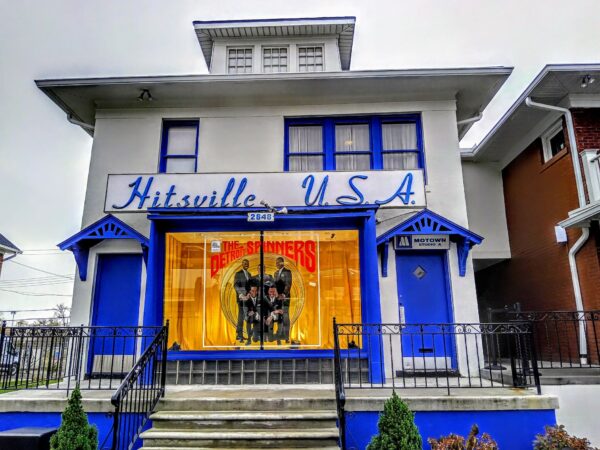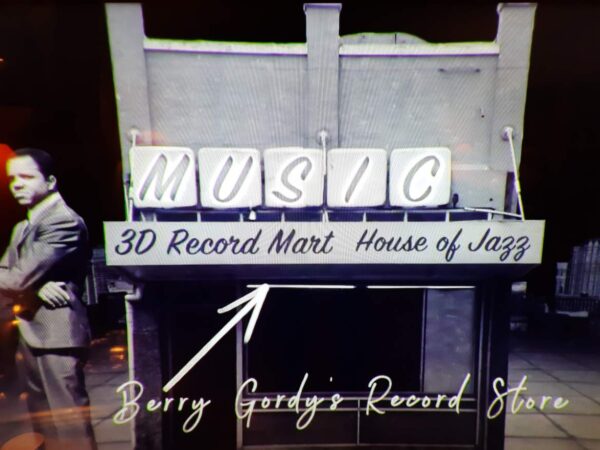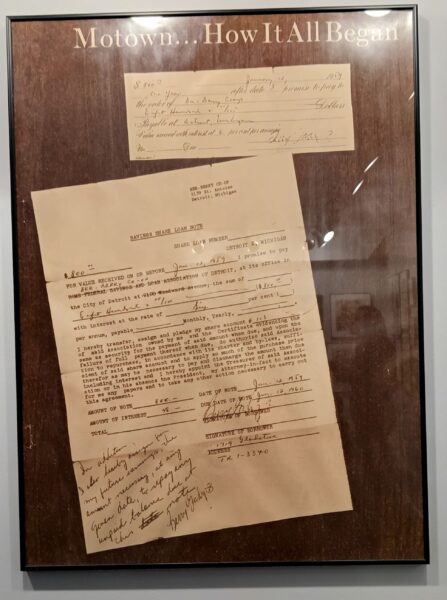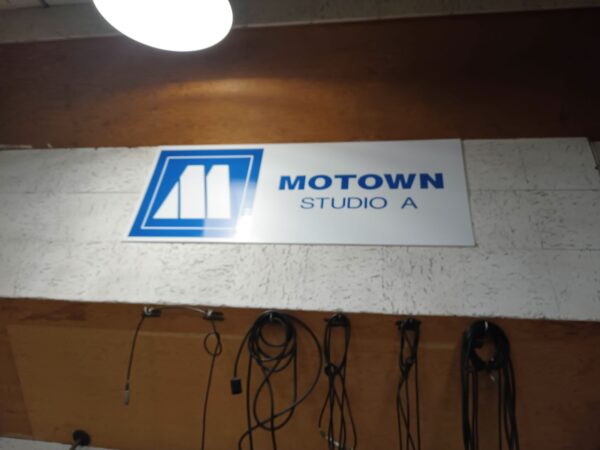Home to much of the U S automotive industry, Detroit is often called the “Motor City” so it makes some sense that soon after establishing Tamla Records on 12 January 1959, Berry Gordy, Jr., a man looking to make his mark on the music industry, added a new appellation to his budding business to reflect the city of its birth. That name was, of course, Motown and it would become not only a musical force over the ensuing decades but also a cultural and political one.
Even if it hadn’t been so culturally important, I couldn’t visit Detroit without visiting the Motown Museum. Regular readers of this blog know the importance of music in my life and, thanks largely to my late brother Steve who introduced me to it, Motown music played prominently throughout the soundtrack of my youth. Thus, West Grand Avenue and Hitsville, U.S.A. was essential.

An $800 loan.
Berry Gordy III, (usually called Berry Gordy, Jr.) was born in Detroit in 1929. His parents had moved from Georgia to Detroit seven years earlier looking for better economic opportunities. Gordy was the seventh of eight siblings and his parents instilled a sense of family unity and entrepreneurship in all of their children. Gordy’s father operated several businesses and created a family credit union requiring contributions from all family members that would become crucial to Berry.
Although he eventually earned a GED, Berry dropped out of high school to pursue a boxing career which he did until 1950 with little success. Then he enrolled in the army and served a tour of duty in Korea before returning to Detroit where he opened the 3D Record Mart – a store that sold LPs and 3D glasses – in 1953.

[Screen capture of mock-up from the Showtime documentary Hitsville].
The store failed and when Berry became a father in August 1954, he sought more conventional employment putting in a stint working for Ford. Throughout this time, Berry also showed an interest in and a passion for music. It was during this period that he met the owner of the Flame Show Bar Talent Club who then introduced Gordy to a young singer named Jackie Wilson. Wilson recorded Reet-Petite a song that Berry had c0-written with his sister Gwen and a friend Billy Davis. Reet-Petite proved a minor hit for Wilson who would go on to record several other songs that Gordy wrote or co-wrote including one of his biggest hits, Lonely Teardrops.
Although he earned very little money from these early recordings, other local musicians recognized Gordy’s talent. During this time, Gordy met and befriended the lead singer of a group called The Matadors. The singer’s name was William Robinson, Jr. who became better known as Smokey and the group would change their name to the Miracles. Encouraged by Robinson, Gordy approached his family and applied for a $1,000 loan from the family credit union with which he planned to start a record label he wanted to call Tammy after the Debbie Reynolds hit of the time. Then, thinking there might be some confusion or copyright issues, he settled on Tamla.
After careful deliberation, perhaps thinking young Berry had done a lot of foolish things, on 12 January 1959, the family approved a loan of only $800

(equal to about $7,650 in 2023) that Gordy not only signed and sealed but delivered a great return on investment. He used some of the money to purchase a house at 2648 West Grand Boulevard – the first purchase in what became known as the Empire on West Grand.
Originally released in August 1959, Barrett Strong’s recording Money (That’s What I Want), became Tamla’s first hit. Licensed to the Anna label, it was distributed by Chicago based Chess Records.
(Perhaps the epitome of a one hit wonder as a performer, Money, as music critic and historian Griel Marcus notes, was “the only song that brought Strong’s name near the top of the national music charts, but that one time has kept him on the radio all his life.” Though Strong’s version can be frequently heard on some oldies channels, some of it’s durability may be due in part to the Beatles 1963 cover version.
However, as a writer, Strong’s story is entirely different. Mainly in collaboration with Norman Whitfield, who also became a prolific producer for the label, Strong wrote the lyrics for I Heard it Through the Grapevine, Edwin Starr’s War, and Smiling Faces Sometimes recorded by Undisputed Truth. As the Temptations adapted their sound to what became known as psychedelic soul, the pair co-wrote songs including Ball of Confusion (That’s What the World Is Today), Cloud Nine, I Can’t Get Next to You, and Papa Was a Rollin’ Stone.)
Plenty of Smokey but more than Smokey.
Relying on his friend Smokey Robinson, Gordy’s first Motown release, Bad Girl came just a month after Money and, in the first inkling of what was to come, The Miracles song became the label’s first national chart single squeezing its way to number 93 on Billboard’s Hot 100. Fortunately, as he looked to build his label, Gordy didn’t have to look very far to find the talent to fill his roster of musicians and writers – starting with Mary Wells.
Just 17 years old, Wells, a Detroit native, was trying to reach Jackie Wilson to have him record her composition Bye Bye Baby. Gordy, who was no longer working with Wilson, intervened and had Wells record the song instead. With the song reaching number 8 on the Billboard R&B singles chart and #45 on the pop chart, the teenager gave Gordy a glimpse of what was to come. Wells would go on to record such hits as You Beat Me to the Punch – the song that made her the first Motown artist to receive a Grammy nomination – and, in 1964, the Smokey Robinson penned My Guy that became her signature recording.
Later that same month, Gordy and Robinson released the product of another successful writing collaboration – Shop Around. The song reached number one on the Billboard R&B singles chart and reached the top spot on the Cashbox Top 100 Pop Chart. Although it topped out at number two on the Billboard Hot 100 Chart, it passed 1,000,000 sales to become the label’s first certified gold record – a distinction that would elude many future Motown hits because Gordy wouldn’t allow independent organizations like the RIAA to review his books.
Still more local talent.
In the late fifties two male groups – the Distants and the Primes – were both performing and engaging in something of a friendly competition around Detroit. As they struggled to succeed, the groups broke apart and some of the singers left the area. The remaining members formed a new group initially calling themselves the Elgins. However, Berry Gordy knew there was another group using that appellation and, in a brainstorming session held on the front steps of the Motown studios, they settled on a new name, The Temptations.
Between 1964 and 1970, the Temptations released 13 LPs. Twelve of the 13 appeared on the U S top 100 Pop chart and 10 topped the U S R&B chart. Their first single to appear in the U S Top 100 was 1964’s The Way You Do the Things You Do which peaked at number 11. By 1970, they saw an additional 27 songs reach the Top 100 including their first number one hit, My Girl.
Meanwhile, the Primes’ manager, Milton Jenkins, decided to create a sister group he called the Primettes made up of friends and girlfriends of the Primes. The four singers were Florence Ballard (who was still in junior high school at the time they started singing in 1958), Betty McGlown, Mary Wilson, and Diana Ross.
Over the next few years they developed a small local following singing mainly doo-wop. By this time, Gordy’s enterprise was known as a place local talent wanted to be so Ross approached an old neighbor – Smokey Robinson – and asked him to arrange an audition. Gordy liked them well enough but thought they were too young and underdeveloped so he instructed them to return after graduating from high school.
Still, the Primettes spent their free time in and around Studio A and

eventually, Gordy let them sing background vocals and add hand claps to some recordings. In January 1961, he agreed to sign them provided they change their name. They settled on The Supremes. They proceeded as a trio because McGlown had left the group to get married and her replacement, Barbara Martin, did the same.
Between 1961 and 1963, the group released six singles. All of them failed to chart earning them the sobriquet – “the No-Hit Supremes.” That wouldn’t last. Their breakout came in 1964, with their first Holland – Dozier – Holland song Where Did Our Love Go.
Ironically, the song had been written for The Marvelettes and The Supremes recorded it only reluctantly. It reached number one on the pop charts as did each of their next four singles. Before they were done, The Supremes topped the charts a dozen times and, until The Spice Girls surpassed them in the 21st-century, they were the biggest selling girl group in history. They remain the biggest selling American girl group.
Brings back great memories. We had a juke box filled with 50s and 60s doo-wop and Motown. That said, Gordy was the type of producer that led artists like Prince to become obsessed with self production and owning their own masters.
You’re jumping ahead, amigo. Remember this is part one of four.
Desculpe mi amigo
Não faz mal.